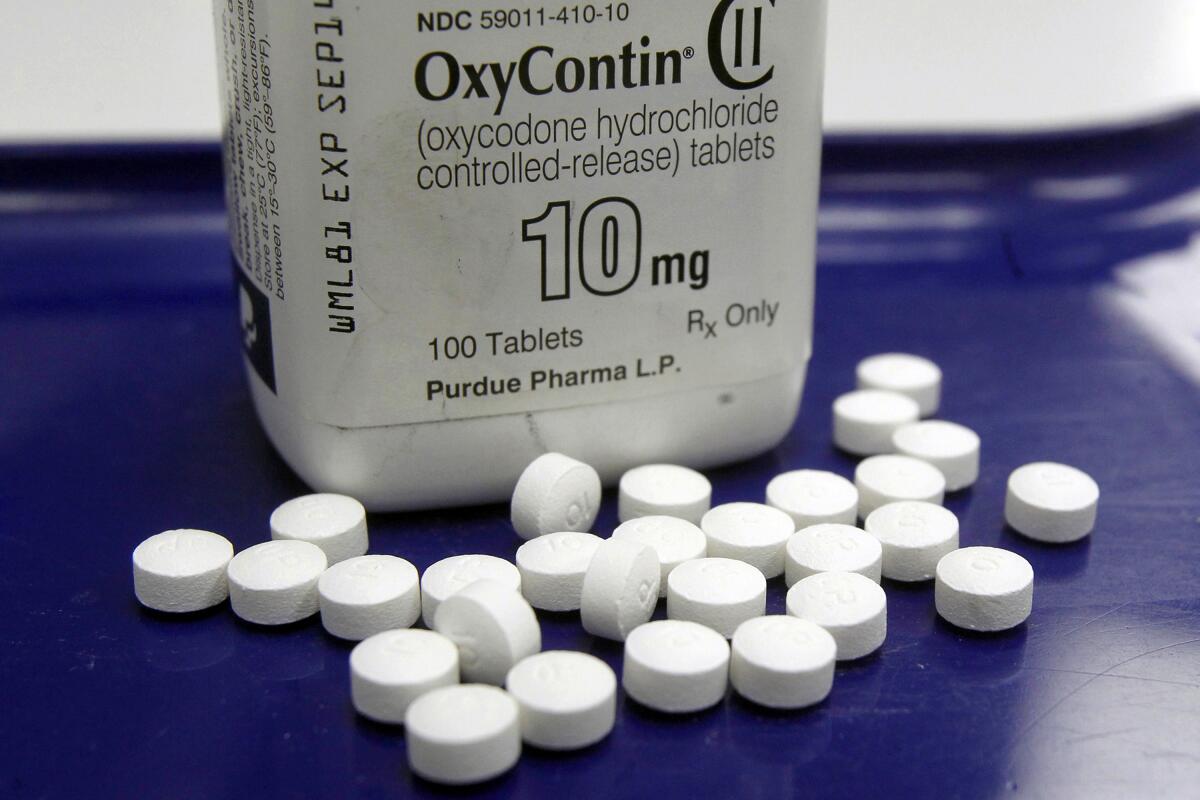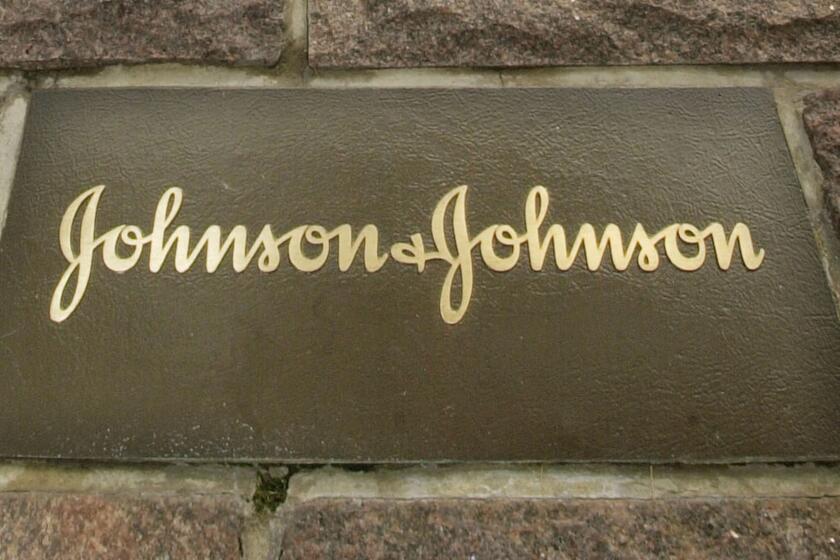J&J and three drug distributors unveil $26-billion opioid deal with states

- Share via
Drugmaker Johnson & Johnson and three opioid distributors agreed to pay a combined $26 billion to resolve thousands of state and local government lawsuits over the handling of addictive painkillers that created a U.S. public-health crisis.
The landmark deal — years in the making — calls for McKesson Corp., Cardinal Health Inc. and AmerisourceBergen Corp. to pay almost $21 billion to resolve allegations they turned a blind eye to suspiciously large opioid shipments, the companies and state attorneys general said Wednesday. J&J will pay $5 billion to settle claims it illegally marketed opioids, which it stopped making last year.
The settlement marks a major step forward in litigation over the highly addictive drugs, which have been blamed for more than 500,000 deaths over two decades. States, cities and counties filed nearly 4,000 suits against more than a dozen drugmakers, distributors and pharmacies seeking compensation for billions spent battling the U.S. opioid epidemic.
“While no amount of money will ever be enough, this settlement will force these drug companies to pay a historic amount of money to bring much-needed treatment and recovery services to North Carolina communities and to change their business practices so that something like this never happens again,” said North Carolina Atty. Gen. Josh Stein, who was on the state negotiating group.
More than 40 states are expected to participate in the deal, Stein said during a news conference with other state attorneys general. Some early adopters already include California, New York, Ohio, Massachusetts, Virginia, Tennessee, Louisiana, Pennsylvania, Connecticut, Delaware and Virginia.
States that weren’t part of the negotiating group get 30 days to sign onto the deal, and several have already announced they will. They’ll then have 120 days to get their local governments on board with accepting cash to drop their lawsuits, with bonuses paid by the companies to get more to sign up. That process has already begun in many states. New York Atty. Gen. Letitia James said she expects the “vast majority” of her state’s communities will sign up.
The companies said they are confident the accord will resolve a substantial portion of their opioid liabilities.
“This settlement will directly support state and local efforts to make meaningful progress in addressing the opioid crisis in the United States,” Michael Ullmann, J&J’s general counsel, said in an emailed statement.
AmerisourceBergen and Cardinal Health said their share of the total will be $6.4 billion each, while McKesson’s share would be $7.9 billion. In a statement, they said the payments will be made over 18 years. J&J will pay $3.7 billion in the first three years and $1.3 billion over the next six years.
While shares of the four companies rose slightly, investors had long suspected a deal was coming. The companies had disclosed terms of their $26-billion offer in securities filings.
Johnson & Johnson has become the latest company to settle a lawsuit to get out of the first federal trial over the nation’s opioid crisis.
The settlement was announced on a day J&J boosted its profit and revenue forecast for the year, buoyed by the strong recovery of its pharmaceutical, medical device and consumer suits, and added sales from its COVID-19 vaccine. The New Brunswick, N.J., company’s shares rose 0.6%.
“Today’s news is another positive development in the opioid settlement for the distributors,” Evercor ISI analysts including Elizabeth Anderson said in a research note to clients. “We see this settlement as likely to encompass almost all jurisdictions, with the definitive timing for joining, also helping to provide resolution and remove the overhang on shares.”
A “critical mass” of states needs to back the deal or it will fall apart, Joe Rice, one of the lawyers representing states, cities and counties, said in a news conference. He didn’t say how many states or local governments are required to keep it alive.
Every day that goes by without money for treatment just prolongs the pain of the opioid epidemic that has only gotten worse during the pandemic, Louisiana Atty. Gen. Jeff Landry said during a news conference. “States that don’t sign on are really being unreasonable.”
Washington state Atty. Gen. Bob Ferguson rejected the offer, saying what the four companies offered is too paltry to adequately address the harm they’ve caused. For the 320 local governments in Washington, the state’s share would total more than $527 million, but that would be just $30 million a year for 18 years.
“Jurisdictions that have gone to trial against these companies have done far better than this agreement,” Ferguson said in a statement, adding that a judge has set a January trial date for his suit against J&J.
In the only other verdict against an opioid maker, an Oklahoma judge ordered J&J in 2019 to pay $465 million for causing a public nuisance in the state with its illegal marketing of its opioid-based painkillers. The Oklahoma Supreme Court is weighing the company’s appeal.
U.S. District Judge Dan Polster, who is overseeing much of the opioid litigation, has pointed to the offers by J&J and the distributors as an example for other companies ensnared in suits over the painkillers.
Local governments decided to sue opioid makers, distributors and pharmacy providers — such as Walmart Inc. — separately to avoid a repetition of what happened in the $246-billion settlement with tobacco makers in 1998. Much of that money wound up in state coffers and never made it down to the city and county level.
Although other opioid defendants already have settled, the deal involving J&J and the distributors is the first global resolution of all claims against a company by states, cities and counties. McKinsey & Co., for example, agreed to a $641-million accord with all 50 states, but it doesn’t cover municipalities’ claims.
The deal also relieves litigation pressure on the distributors, which have been dropped as defendants in New York’s opioid trial on Long Island. J&J already paid $263 million to be removed from that trial.
It’s unclear whether the settlement also will affect the companies’ status in an ongoing trial in federal court in West Virginia. Closing arguments are scheduled for next week. J&J also is facing claims in state court in California over its handing of its former opioid painkillers.
Bloomberg writer Riley Griffin contributed to this report.
More to Read
Inside the business of entertainment
The Wide Shot brings you news, analysis and insights on everything from streaming wars to production — and what it all means for the future.
You may occasionally receive promotional content from the Los Angeles Times.











